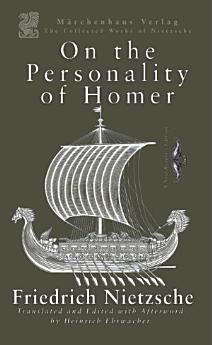On the Personality of Homer: A New Reader's Edition
May 2024 · The Collected Works of Friedrich Nietzsche Book 9 · Marchen Press
Ebook
120
Pages
family_home
Eligible
info
reportRatings and reviews aren’t verified Learn More
About this ebook
This work is Nietzsche's inaugural lecture at the University of Basel was delivered on May 28, 1869 under the title "Über die Persönlichkeit Homers" (On the Personality of Homer). It was subsequently published as "Homer und die klassische Philologie" (Homer and Classical Philology), Basel: Bonfantini, 1869. On the Personality of Homer was given by the newly minted Professor Nietzsche at the Basel Museum on May 28, 1869, and subsequently published by the foundation administered by his sister. This lecture was first published in the volume "Gesammelte Werke" edited by Peter Gast (a pseudonym for Heinrich Köselitz, a close associate of Nietzsche) and Elisabeth Förster-Nietzsche (Nietzsche's sister). They were included in the second series of these collected works under the title "Philologica", published in 1897. This was part of the effort to compile and publish Nietzsche's unpublished manuscripts and lecture notes after his death. On the Personality of Homer is an early Pathography and Philological work which explores the enigmatic figure of Homer, the legendary poet traditionally attributed with composing the Iliad and the Odyssey. It investigates the historical and literary questions surrounding Homer’s identity. Nietzsche delves into the debates of his time about whether Homer was a single individual or a symbolic representation of a collective tradition of oral storytelling. Through academic philological analysis of the existing Greek texts, Nietzsche scrutinizes the textual and stylistic features of the Homeric epics, making arguments about the nature of authorship and creativity in ancient Greek literature. This essay occupies a distinct place within Nietzsche's broader corpus, reflecting his scholarly background and the beginnings of his critical approach to philosophical issues. While not as widely known or as influential as his later philosophical works, On the Personality of Homer provides an early glimpse into Nietzsche's analytical prowess. The work foreshadows his later critiques of cultural and historical constructs, illustrating his early engagement with themes of identity and authorship that would evolve in his subsequent writings. This modern translation from the original manuscript is designed to allow the armchair philosopher to engage deeply with Nietzsche's works. The language is modern and clean, with simplified sentence structures and diction to make Nietzsche's complex language and arguments as accessible as possible. This Reader's Edition also contains extra material that amplifies the manuscript with autobiographical, historical and linguistic context. The edition includes an Afterword by the Translator on the history, impact and intellectual legacy of Nietzsche in context of this work, an index of Philosophical concepts used by Nietzsche with a focus on Existentialism and Phenomenology, a complete chronological list of Nietzsche's entire body of works, and a detailed timeline of Nietzsche's life journey, including the personal relationships which greatly influenced his philosophy.
About the author
Friedrich Nietzsche (1844-1900) was a watershed German philosopher, cultural critic, poet, musician (briefly) and philologist (the study of ancient manuscripts) whose work has had a profound impact on modern intellectual history. Known for his critiques of European morality and religion (particularly Protestantism), Nietzsche's ideas on the "will to power" and the "Übermensch" have influenced a wide range of philosophical, literary, and psychological thought including thinkers such as Martin Heidegger, Albert Camus, Michael Foucault and the entire Postmodern religion.
Rate this ebook
Tell us what you think.
Reading information
Smartphones and tablets
Install the Google Play Books app for Android and iPad/iPhone. It syncs automatically with your account and allows you to read online or offline wherever you are.
Laptops and computers
You can listen to audiobooks purchased on Google Play using your computer's web browser.
eReaders and other devices
To read on e-ink devices like Kobo eReaders, you'll need to download a file and transfer it to your device. Follow the detailed Help Center instructions to transfer the files to supported eReaders.











